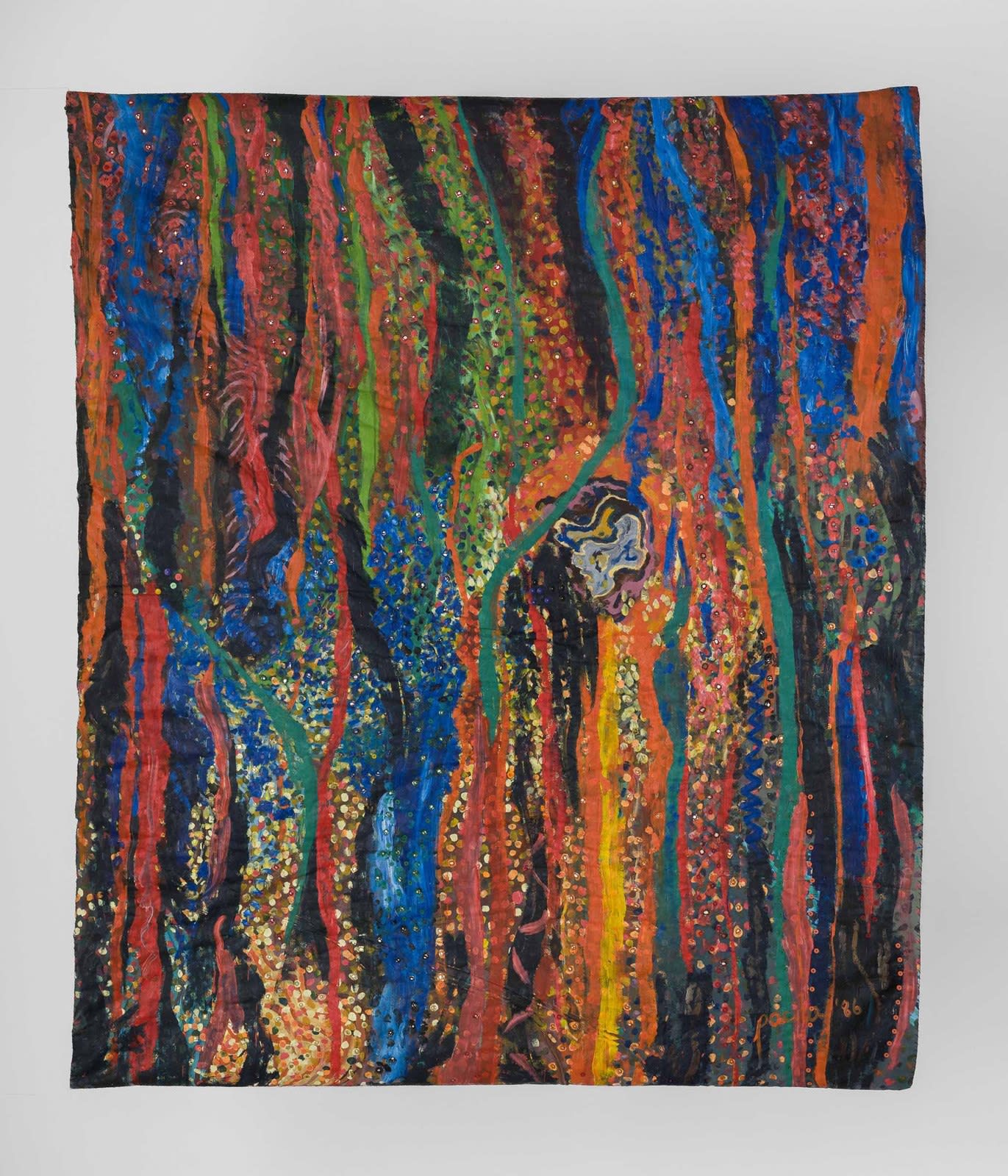-
Artworks





Pacita Abad
Palengke, 1986Oil, acrylic, mirrors, buttons on stitched and padded canvas99 x 82 in
251.5 x 208.3 cmFurther images
PALENGKE A palengke refers to a wet market in the Filipino context, drawing from the Spanish word palenque, which literally means "wooden palisade or stockade," used to describe an enclosed area used for public gatherings. This title embodies a double meaning, referencing both the circulation of perishable goods at the palengke, while also alluding to the different cultures present in the rich visual motifs and found objects that swirl throughout Palengke's textured surface. Palengke is adorned with tiny mirrors and colorful buttons, creating a layered effect that interweaves contrasting elements of texture and color. The undulating surface of this painting is also accentuated by Abad's method of stuffing and stitching through her fabrics, drawing one's attention to the extreme care Abad took in creating her trapuntos and learning about those she encountered. The colors and textures in Palengke are as bright and nuanced as the marketplace subjects it depicts. ABSTRACT EMOTIONS SERIES In her "Abstract Emotions" series, Abad references her experiences collecting textiles in Indonesia, including visiting batik centers in Surakarta, ikat weaving centers in Sumba, batik factories in Yogyakarta, as well as her trips to aboriginal lands in Australia's Northern Territories and the Montreux Jazz Festival in Switzerland. The later works in the "Abstract Emotions" series contemplate Abad's emotional loss after her mother's passing in 1991. Tying together the emotive impulse present in post-war Western abstraction with the heritage traditions of the Global South, Abad's series offers a modernist hybridity based in solidarity and lived experience rather than appropriation.PALENGKE A palengke refers to a wet market in the Filipino context, drawing from the Spanish word palenque, which literally means "wooden palisade or stockade," used to describe an enclosed area used for public gatherings. This title embodies a double meaning, referencing both the circulation of perishable goods at the palengke, while also alluding to the different cultures present in the rich visual motifs and found objects that swirl throughout Palengke's textured surface. Palengke is adorned with tiny mirrors and colorful buttons, creating a layered effect that interweaves contrasting elements of texture and color. The undulating surface of this painting is also accentuated by Abad's method of stuffing and stitching through her fabrics, drawing one's attention to the extreme care Abad took in creating her trapuntos and learning about those she encountered. The colors and textures in Palengke are as bright and nuanced as the marketplace subjects it depicts. ABSTRACT EMOTIONS SERIES In her "Abstract Emotions" series, Abad references her experiences collecting textiles in Indonesia, including visiting batik centers in Surakarta, ikat weaving centers in Sumba, batik factories in Yogyakarta, as well as her trips to aboriginal lands in Australia's Northern Territories and the Montreux Jazz Festival in Switzerland. The later works in the "Abstract Emotions" series contemplate Abad's emotional loss after her mother's passing in 1991. Tying together the emotive impulse present in post-war Western abstraction with the heritage traditions of the Global South, Abad's series offers a modernist hybridity based in solidarity and lived experience rather than appropriation.Literature
Pacita Abad: Exploring the Spirit and the Senses, published by the Metropolitan Museum of Manila, Philippines, and National Gallery of Indonesia, 1996, p.35
2of 2
Join our mailing list
* denotes required fields
We will process the personal data you have supplied in accordance with our privacy policy (available on request). You can unsubscribe or change your preferences at any time by clicking the link in our emails.









